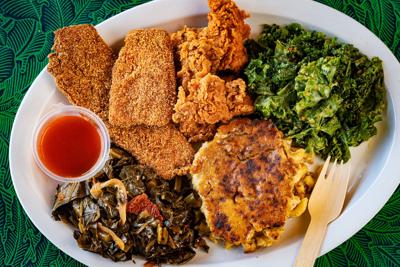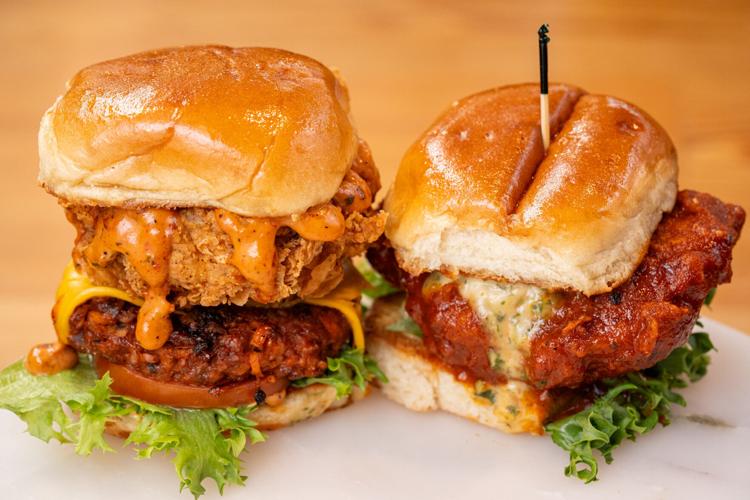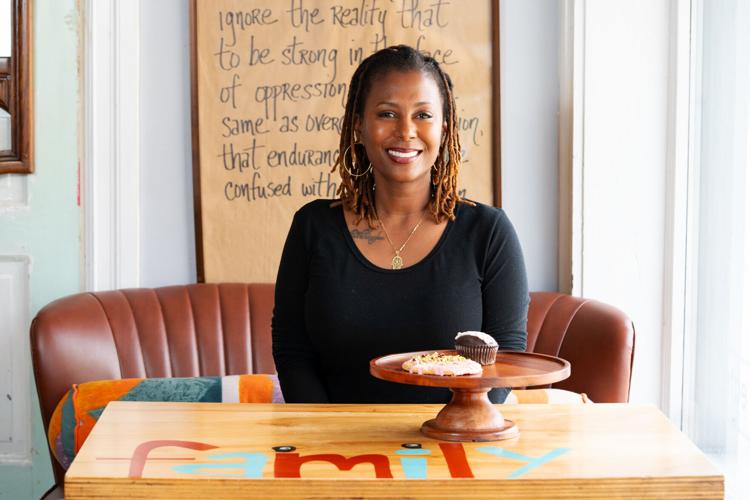Ëú╠Ď╩ËĂÁ is home to an incredible array of restaurants, and many of the cityÔÇÖs best spots for vegan, vegetarian and plant-based dining are owned and operated by Black women. From SweetArt Bakeshop + Caf├ę and AdinaÔÇÖs Vegan Cuisine to Bougie Bites STL, these eateries have redefined how the city experiences and understands vegan cuisine.
Despite the restaurant industryÔÇÖs notorious instability, these businesses and their owners have managed to feed and nourish Ëú╠Ď╩ËĂÁ through the years, not only becoming leaders in their communities but also exposing more people to the benefits of plant-based food. Statistically speaking, about 41 percent of restaurant businesses are minority-owned, according to the National Restaurant Association. Only 9 percent of those are owned by Black entrepreneurs. However, according to the Pew Research Center, ÔÇťa nonpartisan think tank that provides insights on social issues, public opinion and demographic trends,ÔÇŁ Black-owned businesses in the U.S. have experienced significant growth in recent years. And in the U.S. in general, Black business owners are more likely to be men than women.
People are also reading…
So, whatÔÇÖs the link between these broader statistics and the plant-based food ventures led by Black women in Ëú╠Ď╩ËĂÁ? Reine Keis, owner of SweetArt Bakeshop + Caf├ę and SweetArt Too, theorizes that the world has not traditionally associated plant-based eating and lifestyles with Black culture. ÔÇťI know when I first opened in 2008, I was making food that I was eating at home, and my family and friends were also eating that way,ÔÇŁ she explains. ÔÇťNow, veganism is becoming more associated with Black people, and weÔÇÖre added into the construct of what good vegan food is. ItÔÇÖs definitely something thatÔÇÖs associated with the culture; we want delicious vegan food that makes us think of our upbringing and thatÔÇÖs soulful, flavored and seasoned.ÔÇŁ Growing up, KeisÔÇÖ grandparents always had vegetables on the table ÔÇô salad, greens, sweet potatoes, corn and more. They werenÔÇÖt vegetarian, but they cooked and prepared mostly whole foods and plenty of vegetables. ÔÇťI think a lot of Black people gravitate toward vegan and vegetarian diets because they care about their diets,ÔÇŁ Keis continues. ÔÇťThey want to offset some of the things that have been associated with Black folks in the culture ÔÇô high blood pressure and diabetes and things like that. WeÔÇÖve always wanted to take care of ourselves and eat better.ÔÇŁ
At AdinaÔÇÖs Vegan Cuisine, opened in Pagedale in 2022 by Cheryl (Adina) McKinney and her daughter Vicki (Ahturah) Jordan, McKinney points to the fact that the world of plant-based food can be tricky to navigate ÔÇô especially if youÔÇÖre not sure how to incorporate more vegetables into your routine. ÔÇťWe make dishes that most people know and love but with a healthy twist, so the dishes arenÔÇÖt completely foreign to someone whoÔÇÖs new or curious about vegan food,ÔÇŁ she says. ÔÇťThereÔÇÖs an awakening thatÔÇÖs happening, and we as a community are starting to realize how important health is. The food you eat has a direct correlation with how healthy you are or will be in the future.ÔÇŁ
McKinney began her journey into vegan eating more than 28 years ago after becoming ill at a restaurant and having to be hospitalized. By that point, she and her husband had already started to think about food from a health standpoint. ÔÇť[That experience] felt like a clear sign to change,ÔÇŁ she recalls. ÔÇťFrom there, I wanted to make sure I continued to create dishes that my family would eat and love. This got my creative juices flowing.ÔÇŁ She and Jordan have been coming up with new ideas for recipes ever since.
So far, entrepreneur and Bougie Bites STL owner Latoya Elnora Thompson has been using a food truck and ghost kitchen to prepare her vegetarian and plant-based fare. Her brick-and-mortar location is due to open this year. Thompson founded the brand because she wanted to offer plant-based food that feels ÔÇťindulgent, familiar and accessible.ÔÇŁ She didnÔÇÖt grow up vegan ÔÇô nor did many people in her community, she remembers. But like McKinney, Thompson wanted to focus on creating plant-based comfort food that was anything but intimidating. ÔÇť[Some] people assume vegan food is bland, overly ÔÇśhealthyÔÇÖ or just not for them, and I love proving them wrong,ÔÇŁ she laughs. ÔÇťBy making plant-based food approachable and crave-worthy, weÔÇÖre creating space for more people ÔÇô whether theyÔÇÖre vegan, plant-curious or just looking for something new ÔÇô to enjoy food that aligns with their values and tastes good.ÔÇŁ
Thompson says she values the link between plant-based eating and Black culture, that her restaurant ownership is part of that dialogue. And in her cooking, she aims to honor her roots while pushing positivity forward. ÔÇťThe connection has always been there; itÔÇÖs just evolving,ÔÇŁ she explains. ÔÇťIf you look back, our ancestors were eating plant-based food long before it was called that. Fresh produce, grains, legumes ÔÇô that was survival, that was culture. Now, more people in the Black community are rediscovering that.ÔÇŁ
Keis remains hopeful that future generations will see continued progress ÔÇô both in the growing appreciation for plant-based eating and in creating more opportunities for Black restaurant owners. ÔÇťBeing a Black woman in this industry ÔÇŽ youÔÇÖre not even thinking of how hard it is because the industry in general is very hard,ÔÇŁ she explains. ÔÇťIÔÇÖve never been invited to the club of ÔÇśthose in the know.ÔÇÖ [As Black women], weÔÇÖre constantly on the outskirts. This is not an industry designed to highlight women at all, and itÔÇÖs hard for everyone. You do it because youÔÇÖre passionate, and you get your customers. ThatÔÇÖs who youÔÇÖre doing it for.ÔÇŁ
For Jordan, one half of AdinaÔÇÖs, concentrating on the growth of Black-owned businesses ÔÇô and nourishing Ëú╠Ď╩ËĂÁ in general ÔÇô is essential. ÔÇťWe just continue to do what we love to do, which is prepare delicious plant-based food and share it with the community,ÔÇŁ she says. ÔÇťWe receive support from vegans and non-vegans who are black, white, men, women, et cetera, [all from] diverse backgrounds. We love serving the community, and the support we receive in return makes it all worth it.ÔÇŁ
And rather than giving too much thought to the statistics, Thompson concentrates on the present moment, the matters close at hand. ÔÇťBeing an entrepreneur in the food industry ÔÇŽ comes with challenges ÔÇô from being underestimated to navigating spaces that werenÔÇÖt built with me in mind,ÔÇŁ she says. ÔÇťBut I donÔÇÖt spend time thinking about whoÔÇÖs in the room ÔÇô I focus on making sure I belong there. ÔÇŽ What I see is a growing community of people ÔÇô especially women, especially people of color ÔÇô who are stepping into food spaces and changing the narrative. Representation matters: Not just in the food itself, but in whoÔÇÖs leading the business.ÔÇŁ┬á
AdinaÔÇÖs Vegan Cuisine, 6746 Page Ave. Ste. 120 A, Ëú╠Ď╩ËĂÁ, Missouri,
Bougie Bites STL,
SweetArt and SweetArt Too, multiple locations,

















